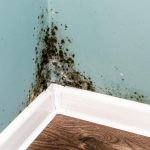Mold and mold spores are everywhere in our environment. Household mold includes the slimy black spots on your shower curtain, the fuzzy white patches on your basement floor, the slick orange film that forms on your kitchen drain, and the dark spots in walls or ceilings. Even if mold is not visible it may be noticeable by a foul or musty smell localized in the home or building.
Mold exposure can irritate your eyes, skin, nose, throat, and lungs. Mold can trigger asthma attacks. Infants and children, the elderly, those with compromised immune systems, and people suffering from chronic lung disease are especially sensitive to mold.
Mold thrives in moist, dark areas. Once moisture has infiltrated a structure and settled into wood or drywall, it can harbor mold growth. Once mold starts to grow, its spores disperse and spread throughout the home through the air. It can be everywhere.
Do you see spots of suspected mold or is you or your family are experiencing any of the following symptoms?
- Allergies have suddenly grown worse
- Sudden itching, sneezing, and rashes
- Feeling irritable and lethargic
- Difficulty breathing and/or sleeping
If so, you may want to have your home tested for mold. If mold is detected, it needs to be removed or mitigated by experienced personnel.
The first step is testing. Downey Insepctions can do air sampling and take samples of suspected mold for laboratory analysis. Downey Inspections can work with you to find the source of moisture intrusion to help begin the mitigation process.
Contact Downey Inspections at (402) 750-7363 or jon.m.downey@outlook.com to set up a consultation.


